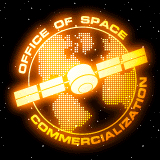November 25, 2007
The GPS III modernization program came up short in the 2008 fiscal year (FY08) Department of Defense (DoD) appropriations bill signed into law by President Bush on November 13.
In passing H.R. 3222, Congress reduced the president’s request by $100 million to $487.23 million for the budgetary year ending next October 1.
Military GPS M-code user equipment (MUE) did better, however: gaining $63.2 million on Capitol Hill, over and above the $93.27 proposed in the administration’s budget, for a total of $156.47 million.
Read More >
By Glen Gibbons







